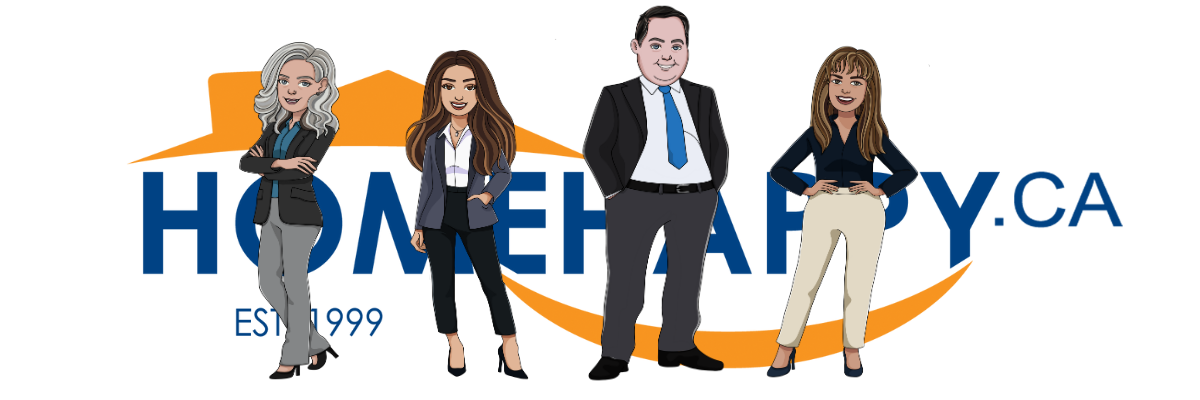Do You Need Time For Your Retirement Investments To Recover?
HomeHappy • August 4, 2020

COVID-19 is wreaking havoc on retirement investments, particularly for those who rely on dividends as part of their income. Over the past decade, many older Canadians have taken a riskier approach with retirement investments because of low bond yields and interest rates caused by the financial crisis in 2008.
Instead of playing it safe, many retirees have turned to the stock market for better returns and dividend income. With global markets in a highly volatile state due to the pandemic, right now it is challenging to move investments to safer ground, and many companies have put dividend payments on hold.
If you need immediate cash to ride out the remainder of the pandemic, you may think you need to liquidate some investments. But what if there were other options that can provide the much-needed cash without taking investment losses? Consider borrowing from your home equity instead of liquidating investments prematurely. Here’s why this makes sense.
Take advantage of low interest rates
Uncertainty in the economy has caused the government to lower interest rates. Mortgage rates are at historic lows, and borrowing money at this point in time doesn’t cost a lot. By gaining access to your home equity through mortgage financing, you can somewhat bridge the gap. You can increase your cash flow until the markets, economy, and your investment portfolio recover.
Historically, stock markets have always recovered.
Bloomberg’s Canadian retirement expert Dale Jackson explains, “The S&P 500 lost half its value between October 2007 when the meltdown began and its March 2009 bottom. By October 2013, the S&P 500 topped its pre-meltdown high and has since doubled from there (pre-pandemic). It wasn’t until June 2014 that the TSX topped its pre-meltdown high. It has since rallied an additional 20 per cent (pre-pandemic).”
If the markets recovered both the Great Depression and Great Recession, there’s little reason to fear it won’t happen post-pandemic. The timing of the recovery, however, is uncertain.
Strategically tapping into home equity
You may be reluctant to use home equity to provide for living expenses until the post-pandemic economy recovers. And that is understandable. You worked hard to pay off your mortgage, why would you want a new one?
Well, if you’re faced with the choice of selling investments at a loss, or borrowing against your home equity to give yourself time to bridge the current cash flow gap and allow your investments to recover, it really becomes a matter of calculating the dollars and cents.
This is where expert financial planning comes in. You should be considering ALL your options, not just the ones we’ve been conditioned to consider over the years.
Unfortunately, there is no guidebook for navigating a global pandemic. However, there are options you can consider, now is a good time to consider them.
Reverse Mortgage
If you’re 55+ and occupying your home as your primary residence, you should seriously consider a reverse mortgage. It’s the ultimate mortgage deferral option.
You’ve likely seen commercial ads for reverse mortgages. And while some people think this is a risky way to access funds, if you intend to live in your home throughout your retirement years, it can be an inexpensive source of funds. Especially given our current low-rate environment.
One common misconception is that the bank owns your home if you get a reverse mortgage. This just simply isn’t true. A reverse mortgage is like any other mortgage, however, instead of making regular payments, the mortgage amount increases each year and is due when you choose to sell your house.
Other mortgage options
If you’ve got a steady pension income, you may be able to qualify for conventional mortgage financing. However, if you’re still paying off your first mortgage, you can apply for a second mortgage based on the remaining equity in your home.
It should be noted that a second mortgage is a high-risk option with significantly higher interest rates. If you’re cash-strapped already and are having trouble making payments on your first mortgage, there’s no benefit gained by adding a second payment.
Another option to consider is a Home Equity Line of Credit (HELOC), which operates much like a bank overdraft. It’s a pool of funds attached to your home that can be used when cash flow is low and paid back when cash flow improves. Interest rates are typically low because the line of credit is secured by your home equity. Further, interest is calculated based on actual borrowing not on the amount approved.
Avoid Fear-Based Decisions
Making fear-based investment decisions rarely work out. Because these are uncertain times, it’s important to consult with financial experts to discuss your options and allay your concerns.
Remember you’re not alone. Millions of Canadians are in similar circumstances. There are options. As part of a solid financial plan, using your home equity can provide funds that act as a bridge to avoid investment losses until the economy and market recover.
If you’d like to discuss your financial situation, contact us anytime for a free consultation. We would love to work through all your options with you!
Share:
Recent Posts

So, you’re thinking about buying a home. You’ve got Pinterest boards full of kitchen inspo, you’re casually scrolling listings at midnight, and your friends are talking about interest rates like they’re the weather. But before you dive headfirst into house hunting— wait . Let’s talk about what “ready” really means when it comes to one of the biggest purchases of your life. Because being ready to own a home is about way more than just having a down payment (although that’s part of it). Here are the real signs you're ready—or not quite yet—to take the plunge into homeownership: 1. You're Financially Stable (and Not Just on Payday) Homeownership isn’t a one-time cost. Sure, there’s the down payment, but don’t forget about: Closing costs Property taxes Maintenance & repairs Insurance Monthly mortgage payments If your budget is stretched thin every month or you don’t have an emergency fund, pressing pause might be smart. Owning a home can be more expensive than renting in the short term—and those unexpected costs will show up. 2. You’ve Got a Steady Income and Job Security Lenders like to see consistency. That doesn’t mean you need to be at the same job forever—but a reliable, documented income (ideally for at least 2 years) goes a long way in qualifying for a mortgage. Thinking of switching jobs or going self-employed? That might affect your eligibility, so timing is everything. 3. You Know Your Credit Score—and You’ve Worked On It Your credit score tells lenders how risky (or trustworthy) you are. A higher score opens more doors (literally), while a lower score may mean higher rates—or a declined application. Pro tip: Pull your credit report before applying. Fix errors, pay down balances, and avoid taking on new debt if you’re planning to buy soon. 4. You’re Ready to Stay Put (At Least for a Bit) Buying a home isn’t just a financial decision—it’s a lifestyle one. If you’re still figuring out your long-term plans, buying might not make sense just yet. Generally, staying in your home for at least 3–5 years helps balance the upfront costs and gives your investment time to grow. If you’re more of a “see where life takes me” person right now, that’s totally fine—renting can offer the flexibility you need. 5. You’re Not Just Buying Because Everyone Else Is This one’s big. You’re not behind. You’re not failing. And buying a home just because it seems like the “adult” thing to do is a fast way to end up with buyer’s remorse. Are you buying because it fits your goals? Because you’re ready to settle, invest in your future, and take care of a space that’s all yours? If the answer is yes—you’re in the right headspace. So… Are You Ready? If you’re nodding along to most of these, amazing! You might be more ready than you think. If you’re realizing there are a few things to get in order, that’s okay too. It’s way better to prepare well than to rush into something you're not ready for. Wherever you’re at, I’d love to help you take the next step—whether that’s getting pre-approved, making a plan, or just asking questions without pressure. Let’s make sure your homebuying journey starts strong. Connect anytime—I’m here when you’re ready.

Bank of Canada maintains policy rate at 2¼%. FOR IMMEDIATE RELEASE Media Relations Ottawa, Ontario January 28, 2026 The Bank of Canada today held its target for the overnight rate at 2.25%, with the Bank Rate at 2.5% and the deposit rate at 2.20%. The outlook for the global and Canadian economies is little changed relative to the projection in the October Monetary Policy Report (MPR). However, the outlook is vulnerable to unpredictable US trade policies and geopolitical risks. Economic growth in the United States continues to outpace expectations and is projected to remain solid, driven by AI-related investment and consumer spending. Tariffs are pushing up US inflation, although their effect is expected to fade gradually later this year. In the euro area, growth has been supported by activity in service sectors and will get additional support from fiscal policy. China’s GDP growth is expected to slow gradually, as weakening domestic demand offsets strength in exports. Overall, the Bank expects global growth to average about 3% over the projection horizon. Global financial conditions have remained accommodative overall. Recent weakness in the US dollar has pushed the Canadian dollar above 72 cents, roughly where it had been since the October MPR. Oil prices have been fluctuating in response to geopolitical events and, going forward, are assumed to be slightly below the levels in the October report. US trade restrictions and uncertainty continue to disrupt growth in Canada. After a strong third quarter, GDP growth in the fourth quarter likely stalled. Exports continue to be buffeted by US tariffs, while domestic demand appears to be picking up. Employment has risen in recent months. Still, the unemployment rate remains elevated at 6.8% and relatively few businesses say they plan to hire more workers. Economic growth is projected to be modest in the near term as population growth slows and Canada adjusts to US protectionism. In the projection, consumer spending holds up and business investment strengthens gradually, with fiscal policy providing some support. The Bank projects growth of 1.1% in 2026 and 1.5% in 2027, broadly in line with the October projection. A key source of uncertainty is the upcoming review of the Canada-US-Mexico Agreement. CPI inflation picked up in December to 2.4%, boosted by base-year effects linked to last winter’s GST/HST holiday. Excluding the effect of changes in taxes, inflation has been slowing since September. The Bank’s preferred measures of core inflation have eased from 3% in October to around 2½% in December. Inflation was 2.1% in 2025 and the Bank expects inflation to stay close to the 2% target over the projection period, with trade-related cost pressures offset by excess supply. Monetary policy is focused on keeping inflation close to the 2% target while helping the economy through this period of structural adjustment. Governing Council judges the current policy rate remains appropriate, conditional on the economy evolving broadly in line with the outlook we published today. However, uncertainty is heightened and we are monitoring risks closely. If the outlook changes, we are prepared to respond. The Bank is committed to ensuring that Canadians continue to have confidence in price stability through this period of global upheaval. Information note The next scheduled date for announcing the overnight rate target is March 18, 2026. The Bank’s next MPR will be released on April 29, 2026. Read the January 28th, 2026 Monetary Report

Thinking of Calling Your Bank for a Mortgage? Read This First. If you're buying a home or renewing your mortgage, your first instinct might be to call your bank. It's familiar. It's easy. But it might also cost you more than you realize—in money, flexibility, and long-term satisfaction. Before you sign anything, here are four things your bank won’t tell you—and four reasons why working with an independent mortgage professional is the smarter move. 1. Your Bank Offers Limited Mortgage Options Banks can only offer what they sell. So if your financial situation doesn’t fit neatly into their guidelines—or if you’re looking for competitive terms—you might be out of luck. Working with a mortgage broker? You get access to mortgage products from hundreds of lenders : major banks, credit unions, monoline lenders, alternative lenders, B lenders, and even private funds. That means more options, more flexibility, and a much better chance of finding a mortgage that fits you. 2. Bank Reps Are Salespeople—Not Mortgage Strategists Let’s be honest: most bank mortgage reps are trained to sell their employer’s products—not to analyze your financial goals or tailor a long-term mortgage plan. Their job is to generate revenue for the bank. Independent mortgage professionals are different. We’re not tied to one lender—we’re tied to you. Our job is to shop around, negotiate on your behalf, and recommend the mortgage that offers the best balance of rate, terms, and flexibility. And yes, we get paid by the lender—but only after we find you a mortgage that works for your situation. That creates a win-win-win: you get the best deal, we earn our fee, and the lender earns your business. 3. Banks Don’t Lead with Their Best Rate It’s true. Banks often reserve their best rates for those who ask for them—or threaten to walk. And guess what? Most people don’t. Over 50% of Canadians accept the first renewal offer they get by mail. No questions asked. That’s exactly what the banks count on. Mortgage professionals don’t play that game. We start by finding lenders offering competitive rates upfront, and we handle the negotiations for you. There’s no guesswork, no pressure, and no settling for less than you deserve. 4. Bank Mortgages Are Often More Restrictive Than You Think Not all mortgages are created equal. Some come with hidden traps—especially around penalties. Ever heard of a sky-high prepayment charge when someone breaks their mortgage early? That’s often due to something called an Interest Rate Differential (IRD) —and big banks are notorious for using the harshest IRD calculations. When we help you choose a mortgage, we don’t just focus on the interest rate. We look at the whole picture, including: Prepayment privileges Penalty calculations Portability Future flexibility That way, if your life changes, your mortgage won’t become a financial anchor. A Quick Recap What your bank typically offers: Only their own limited mortgage products Sales-focused representatives, not mortgage strategists Default rates that aren’t usually their best Restrictive contracts with high penalties What an independent mortgage professional delivers: Access to over 200 lenders and customized mortgage solutions Personalized advice and long-term financial strategy Competitive rates and terms upfront Transparent, flexible mortgage options designed around your needs Let’s Talk Before You Sign Your mortgage is likely the biggest financial commitment you’ll ever make. So why settle for a one-size-fits-all solution? If you're buying, refinancing, or renewing, I’d love to help you explore your options, explain the fine print, and find a mortgage that truly works for you. Let’s start with a conversation—no pressure, just good advice.





